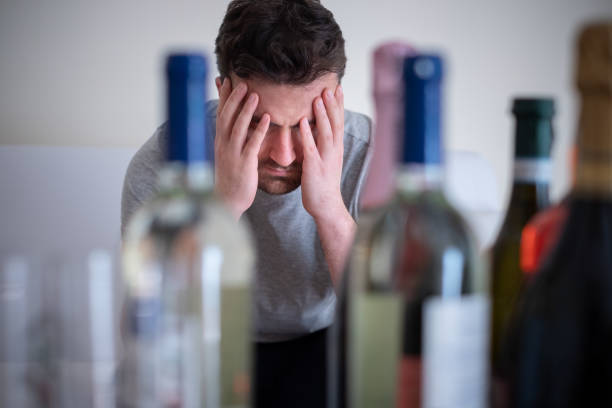When confronted with a hangover, your utmost concern is to recover as quickly as possible. While there is no instant solution, you can reduce hangover symptoms and avoid them in the future. Hangovers entail headaches, dizziness, and nauseas. Taking ample rest, steering clear of congeners, staying hydrated, and having a nourishing breakfast are among the various approaches to rejuvenate your mind and body after a night of alcohol consumption.
Continue reading to discover valuable suggestions on how to avoid hangovers!
What Is A Hangover?
Hangovers are the collection of unpleasant symptoms that occur after consuming an excessive amount of alcohol. These symptoms may include:
- Fatigue
- Thirst
- Weakness
- Muscle soreness
- Abdominal pain
- Dizziness
- Anxiety
- Irritability
- Sweating
- Elevated blood pressure
There are various factors that contribute to the occurrence of hangovers. For example, alcohol consumption leads to frequent urination, resulting in dehydration. Upon waking up after a night of heavy drinking, you may experience thirst, fatigue, or a headache.
Additionally, alcohol can cause faster onset of sleep, but it also leads to fragmented sleep, resulting in fatigue. Furthermore, alcohol irritates the lining of the stomach, leading to increased acid production.
Tips For Preventing Hangovers
Avoiding alcohol is the most effective method of preventing a hangover. But, if you are seeking ways to prevent a hangover, the aforementioned advice may not be applicable.
An alternative approach to dealing with a hangover is the “hair of the dog that bit you” remedy, which involves using another alcoholic beverage to reduce the symptoms. The underlying concept of this remedy is that since a hangover is a result of alcohol withdrawal, consuming more alcohol can reduce it. Nevertheless, this remedy only perpetuates the cycle of hangovers, as your body will eventually need to recover from the toxic effects of alcohol.
Here are some more practical and helpful remedies for dealing with a hangover.
Avoid Congeners
When you saw the heading, you might have wondered about the meaning of congeners. Most people don’t think about the amount of congeners in their drinks, or they may not even know what congeners are! Regardless of your familiarity with congeners, you have probably experienced their effects if you’ve ever had a hangover.
Congeners are substances that develop during the fermentation of alcohol. Generally, the more congeners you consume, the worse your hangover will be. Certain drinks contain higher levels of congeners compared to others. Darker alcoholic beverages such as bourbon or cognac have higher concentrations of congeners. Thus, one way to prevent or reduce the severity of a hangover is to choose lighter alcoholic beverages to enjoy and have a lively night.
Pace Yourself
To avoid experiencing a hangover, it is important to maintain a steady pace and check your alcohol intake. Drinking slowly is essential to prevent excessive alcohol consumption. Moderate your alcohol consumption by measuring your drinks and avoiding excessive intake. By slowing down your drinking, you can reduce overall consumption and prevent the unpleasant effects of a hangover.
If you find it challenging to implement these strategies, consider alternating each alcoholic beverage with a non-alcoholic option such as a sports drink or coconut water. This approach allows your body more time to process the alcohol. Additionally, sports drinks can aid in replenishing fluids, nutrients, and electrolytes lost through alcohol consumption.
While it may be tempting to lose track of your alcohol consumption in social settings or underestimate the number of drinks you’ve had, it is crucial to keep a record of each beverage to prevent a hangover. You can make a note of the number of drinks on your phone or pay attention to the time to ensure you do not exceed your body’s alcohol tolerance.
Avoid Shots
To cut the chances of experiencing a hangover, it is advisable to opt for wine, beer, or mixed drinks rather than shots. Opting for beverages with a lower alcohol by volume (ABV) can help prevent severe hangover symptoms in many individuals. Consuming wine, beer, or mixed drinks at a slower pace, rather than taking shots, can also be beneficial. But, it is important not to drink too quickly, as this negates the intended effect.
Furthermore, it is recommended to steer clear of carbonated drinks like seltzers, champagne, or spirits mixed with sparkling or tonic water. The carbonation in these beverages can contribute to bloating or gas, particularly if the drink also contains irritants like yeast. Avoiding these fizzy drinks can help prevent digestive issues the following day.
Another effective strategy is to stay hydrated by drinking water before, during, and after consuming alcohol. Dehydration is a significant factor in hangover symptoms such as fatigue, headaches, and thirst. By ensuring that your body receives an adequate amount of water, you can counteract the dehydrating effects of alcohol.
Drink Water Before, During and After
Remembering to drink water can be the biggest challenge when trying to stay hydrated while consuming alcohol. Thus, it is helpful to be proactive about water intake when planning to drink. Here are some suggestions for drinking water before, during, and after consuming alcohol:
- To ensure that your body is well-hydrated before your first drink, start drinking water in the morning before you consume alcohol.
- Aim to drink one glass of water for every alcoholic beverage you have. This can help counteract the dehydrating effects of each drink.
- Instead of chugging water, sip it slowly. Chugging water after a night of alcohol consumption can strain your body and lead to frequent trips to the bathroom, disrupting sleep.
- After consuming alcohol, consume foods that have high water content, such as melons, cucumber and mushrooms.
- Consider replenishing your electrolytes by drinking Pedialyte or another oral rehydration solution.
In addition to water, other beverages like soda water, honey chrysanthemum tea, and green tea can help speed up your body’s metabolism. Staying hydrated is one of the most effective ways to prevent hangovers.
Sleep In
Upon awakening, your eyes are bleary and your head throbs like a kick-drum. Instead of reluctantly facing the day, there is no harm in returning to sleep. In fact, it is crucial to indulge in ample sleep after consuming a significant amount of alcohol to prevent a severe hangover. If sleeping in is not workable due to work or childcare obligations, it is advisable to aim for an early bedtime.
Give Into Cravings
When dealing with a hangover, a satisfying and nourishing breakfast might be the only thing that motivates you to get out of bed. If you find yourself yearning for a breakfast of bacon, eggs, and hashbrowns after a night of excessive indulgence, rest assured that you’re not alone. Scientifically speaking, there are explanations for this craving.
Certain foods containing alpha-lipoic acid (ALA), such as red meat or potatoes, have been found to reduce hangover symptoms by reducing oxidative stress, which is known to intensify the severity of hangovers. Additionally, studies suggest that foods rich in N-acetylcysteine, like eggs, can help mitigate hangover symptoms. So, when you’re experiencing the aftermath of the previous night’s festivities, feel free to enjoy that traditional breakfast. Also, consider adding the following items to your plate:
- Fruits: Pears and melons have been shown to decrease hangover symptoms, while black currants and cherry tomatoes can increase them. Lemons are a bit unpredictable as they decrease blood alcohol concentration but increase acetaldehyde concentrations, which contribute to hangovers.
- Zinc and Vitamin B3: Research indicates that individuals who consume substantial amounts of zinc and vitamin B3 experience milder hangover symptoms. While animal protein sources are high in both zinc and vitamin B3, it’s still possible to obtain these nutrients if you follow a vegan or vegetarian diet. Some plant-based foods rich in zinc include pumpkin seeds, oats, hemp seeds, chickpeas, black beans, and cashews. As for vitamin B3, you can find it in brown rice, bananas, avocados, peanuts, mushrooms, and asparagus.
Prioritize filling up with food before consuming alcohol as it can be an excellent preventive measure against hangovers. Specifically, consuming carbohydrates before drinking can help maintain stable blood sugar levels. Drops in blood sugar contribute to hangover symptoms such as fatigue and headaches, as the brain lacks the necessary fuel for optimal functioning. Thus, load up on healthy carbs before drinking to minimize the occurrence of hangover symptoms.
In addition to avoiding congeners, staying hydrated, and maintaining a healthy diet and sleep routine, here are some other tips for preventing hangovers:
- Steer clear of taking shots.
- Engage in some physical exercise.
- Keep track of your alcohol consumption.
- Consume alcoholic beverages slowly.
- Sip on ginger tea if you feel nauseated.
Practice Mindfulness
You can use mindfulness techniques to reduce post-drinking anxiety, which is a common occurrence. Deep breathing, journaling, or listening to guided meditations are some practices that can promote relaxation.
Hangover anxiety, also known as “hangxiety,” may arise as the body tries to counteract alcohol’s depressive impact. Although only time can heal these anxious symptoms, practicing mindfulness can provide temporary relief and calm the mind.
Must Read Does IV Therapy Help for Anxiety?
Conclusion
Preventing a hangover requires a combination of responsible drinking habits and taking proactive measures. By pacing yourself, staying hydrated, and considering supplements that assist in alcohol metabolism, you can cut the likelihood and severity of a hangover.

